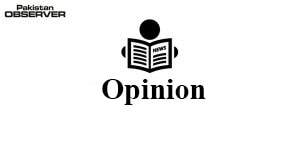Articles and letters may be edited for the purposes of clarity and space. They are published in good faith with a view to enlightening all the stakeholders. However, the contents of these writings may not necessarily match the views of the newspaper.
Tax evasion
Tax evasion is a problem that Pakistan has faced since its very inception. Successive governments have taken measures to control the menace but there has not been much success. Of the many debilitating factors that the country faces, tax evasion is a malady that is simply eating into the innards of the country.
Tax evasion in many forms by individuals is one of the many ills faced by the Federal Bureau of Revenue.
However, the greater problem is corporate tax evasion that is seriously destroying the economy. Many key industries have found innovative and fraudulent ways to commit tax evasion and authorities seem to be nonplussed as to how to get around this menace.
It has been the endeavour of the government for many years to prevent tax evasion by the corporate sector by introducing a Track & Trace system that would monitor the manufacturing actual output of many key industries, such as pharmaceuticals, cement, cigarettes, sugar, etc., and collect the required taxes.
However, for one reason or another, various attempts to introduce a Track & Trace system have been sabotaged and a faulty system has been put in place.
One of the basic pillars of the current government was its commitment to root out corruption from Pakistan. One hopes it will take drastic measures against tax evasion, including installation of an efficient and transparent Track & Trace System.
ATTYAB SHAYAN ZAMAN
Via email
Train accident
On the morning of 7 June, the countrymen woke up to the tragic news of a horrible train accident in Ghotki, Sindh.
A score of people did lose their precious lives in the accident. This is not the first accident during the tenure of the PTI-led government.
It is very sad to pen down that no considerable improvement has been made to improve the railway infrastructure, although it (PTI) had won the elections on the promise of change.
However, it is very important to mention that such accidents have also taken place in the past. The main reason for these accidents is that the higher authorities do not have an effective system that can keep a check on the working of a state institution.
It is my humble request to the honourable Prime Minister to look into this serious matter.
IMRAN A SATTAR
Kech
Rise of new media raises ethical issues
Advancement and development of social media, such as YouTube, Facebook and Twitter, has attracted an ample number of users which has changed the nature of journalism and its ethics as well because the means to publish or broadcast is in the hands of public or citizens. Such new forms of media are interactive and instant which has raised distinct ethical issues too.
As a student of “Media Ethics”, I watched a video on YouTube [News Channel] a few days ago which compelled me to write this piece. In the video, a female reporter covered a protest against Israeli aggression over Palestine.
That one video violated so many journalistic principles and ethics. First of all, the reporter tactically diverted main theme of the protest. Instead of protest and its cause, she discussed the protesters.
The tactic of idea diversion raises a question of what constitutes to be a journalist. She also expressed her views candidly which marks it to be partisan journalism that is against the journalistic principle of impartiality.
In conclusion, the new media blurs the identity and work of journalists. Everyone picks mike and thinks of himself as journalist without any professional degree, course or training.
The traditional media, with the values of accuracy, impartiality, objectivity, confirmation and verification, rubs against the new media or online media which has emphasized on urgency, immediacy, non-professionalism, partiality and non-correction. These all has been taking place because there is no check and balance.
There is no forum or body that must look after the content of such platforms. If government fails to make law for social media regulation, such contents are not stoppable. For instance, recently Peshawar High Court ordered PTA to put down obscene content on TikTok. PTA had no option except ban on TikTok.
Thus, government needs to look into this matter very seriously, and formulate such a body which must monitor social media as PEMRA does electronic media.
MOMAL ALI
Islamabad
Air pollution and its effects
Air pollution comes from natural as well as human-generated sources. Natural sources include volcanoes, forest fire, pollen and dust while man-made sources include industries, power plants, vehicles, etc.
Due to the air pollution people experience many health hazards. There can be short-term effects and long-term effects. Short-term effects include illnesses such as pneumonia or bronchitis.
They also include discomfort such as irritation to the nose, throat or skin, headaches and nausea.
Long-term effects of air pollution can last many years. They can even be fatal. Long-term health effects from air pollution include heart disease, lung cancer and respiratory diseases. Air pollution may also cause long-term damage to people’s nerves, brain, liver and other organs.
Some scientists suspect air pollutants cause birth defects too. Nearly 2.5 million people die worldwide every year from the effects of air pollution.
We need to prove that we are the responsible creatures on this earth and it is our duty to sustain the environment of the earth. We need to avoid the use of industries in large amounts this will provide us a sustainable environment.
BAKHTAWAR KHALIQ
Turbat










